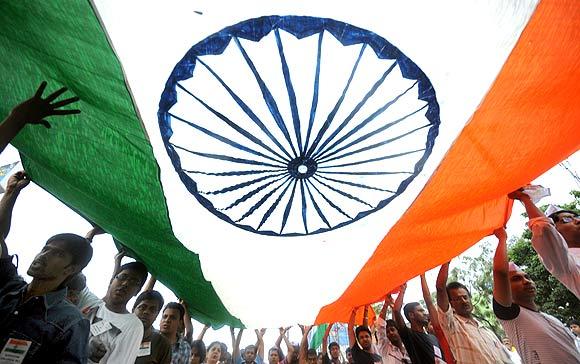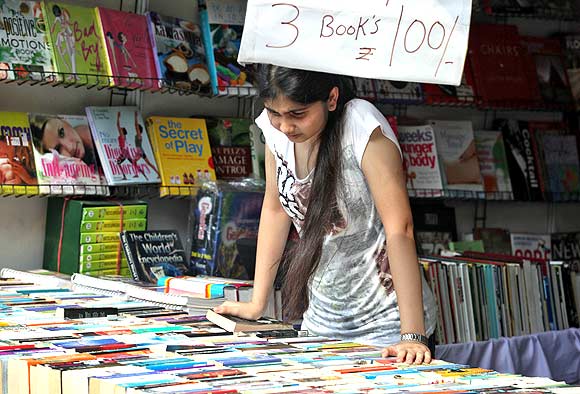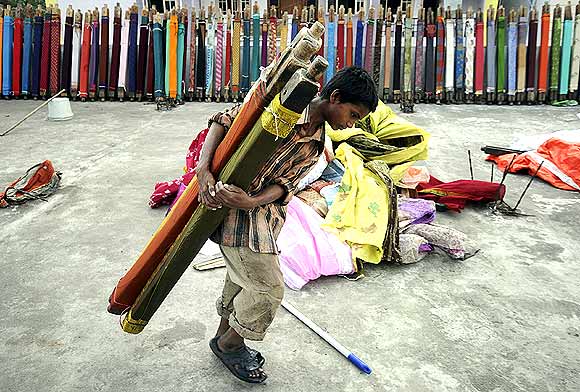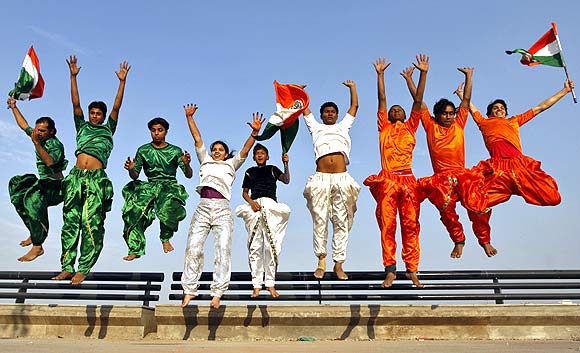Photographs: Krishnendu Halder/ Reuters Sheela Bhatt
'They have been compromised, have taken favours, have other interests and are the people who have betrayed the profession,' legendary editor Vinod Mehta tells Sheela Bhatt.
In New Delhi if an editor were to be judged only on the basis of the freedom he possesses, Vinod Mehta, the celebrated Editor-in-Chief of the Outlook group, would win hands down.
Mehta's life story is about the clash between a journalist and the rich and powerful, which is chronicled admirably in his recent biography Lucknow Boy.
Shobhaa De to Khushwant Singh may have trouble with his book, but the memoir is a fun read.
More recently, Mehta cricitised Salman Rushdie on television for allegedly orchestrating the reading from the banned Satanic Verses at the Jaipur Literature Festival, which Rushdie could not attend because of protests from certain Muslim groups.
In an interview with Sheela Bhatt, the maverick editor -- who calls himself a 'Punjabi from Mumbai's Gowalia tank' -- discusses his book, his classical journalistic values and how some editors have betrayed their profession.
I am picking up a very small thread, but it runs through the book. Are you a very detached person?
When you are writing something like this, either you shouldn't write it, but if you are, then you must be as candid and as honest as possible.
When I decided to write the book, I said I will write it and I won't worry how I come out of the book, or how people I describe, come out. I'll try to be honest and fair.
And then after that we'll see what happens. I am not the kind of person who is very fond of self praise. When people praise me, I get embarrassed, almost. But I know who I am and therefore I don't mind presenting myself in a light, which may not always be good.
There are many occasions when I've made a real fool of myself like that poll on Narendra Modi we did in 2001. We printed the poll. We were proved wrong and then I thought to myself what I am going to do now. So, I said at least all the letters that are attacking me, at least let me give them space.
I shouldn't have carried that (Y B Chavan) story because it was a half-baked story, I didn't have the full supporting evidence.
When all that trouble happened in Bombay, they said they would burn down the Times of India etc. That was one part of the trouble. I thought about my personal culpability in this and as the editor I had made a huge mistake, a professional mistake and I thought I should resign.
of Sheela Bhatt's interview with Vinod Mehta...
'Young people are still our hope'
Image: A young enthusiast at the national Book Fair in LucknowPhotographs: Pawan Kumar/ Reuters
You are known more as a person who has launched the maximum number of publications in your life. What are your dos and don'ts of launching a publication in India?
The first thing that I would do in a daily newspaper is that I would look at the competition and see what is available to the readers. Then I would see whether I was duplicating that or trying to give them something extra.
There are so many areas which are not covered. I'll give you one example.
When I was in Bombay we used to carry, in The Sunday Observer, an arts page. It was a full page which had news on theatre, reviews, feature articles and when I came to Delhi everybody said that Delhi main toh koi arts padta hi nahi hain (no one reads about the arts in Delhi), that this is a political city.
But in The Pioneer we had a full page on an arts. It was a huge hit and I was so happy with that, simply because no one had tried it before and they said Delhi was a political city.
Well if people like politics it doesn't mean they don't like theatre and music. When people gave me some advice I usually went against it.
When you look back, at the 40 years of Indian journalism, do you feel proud of the way Indian journalism has moved on?
No question about it. I am very proud of being part of the journalistic scene, from say 1974 to 2011, in which interesting things have happened.
In this period I do not have much good to say about the editors; I think they've been a mixed lot.
But young people who have entered the profession are very hopeful and even today when I met a 20, 21 year old girl, of course later on she might mellow down a bit, but she's very intelligent and dedicated. She just doesn't want to be any other journalist. She wants to make a difference and I think this is it.
At the reporter-correspondent level there is a great deal of good things happening.
The corruption is at the top, unfortunately, at the editor level. It is at that level who decide the agenda of a paper. They have been compromised, have taken favours, have other interests and they are the people who have betrayed the profession.
And because they are people who guide, who set the agenda for a newspaper or a magazine, I don't think we should judge the younger lots who have no option.
I think, young people are still our hope. But the older, the editors etc have, in a sense betrayed the profession, really.
of Sheela Bhatt's interview with Vinod Mehta...
'10 per cent of India shines and 90 per cent doesn't'
Image: A young boy with rolls of saris in HyderabadPhotographs: Krishnendu Halde/ Reuters
As an editor, any personal belief?
I am a Left Liberal so Outlook is a Left Liberal magazine. I don't believe that journalists are neutral or objective. Journalists are the most opinionated people you can meet anywhere. They have strong views, I am not saying those views are wrong, but they have very strong views.
How can you imagine that when they edit a newspaper they can simply forget their views? They do translate their views into their paper.
Since we have so many papers and we have so much diversity, we will get different points of view, but as far as I am concerned, I make sure that at my own and my senior editors level, we are committed to a Centre-Left society in which the inequality of our people is reported.
That means both shining India and un-shining India, that 10 per cent of India shines and 90 per cent doesn't, is reflected in the magazine. We have tried to promote that India which is not shining and we are committed to that.
In the recent issue you must have seen we had a big essay by Amartya Sen and Jean Dreze who said we are not against growth, we are not against capitalism, but the money that you make in capitalism you must put back into welfare programmes.
The government cannot say that market forces are going to determine anything and everything. We have a broad vision of what India should be like and we try, and I emphasise this word, we try in our publication to promote that idea.
We make no bones that we are not perhaps objective. I say and my editors say openly, these are the ideas we are committed to and if you don't like these views, don't buy the magazine.
of Sheela Bhatt's interview with Vinod Mehta...
'The idea of a secular India is central to my vision'
Image: Students before the Republic Day celebration in AhmedabadPhotographs: Amit Dave/ Reuters
Is that the reason why you seem to be more comfortable with Congress-led governments than the BJP? Is that so?
Yes, there is no question about that. You see there are only two main political parties in India. The Congress and the BJP. You can't say that I'm going to be a Marxist or Leftist because they have no hope of coming to power.
The Congress and BJP are the two big groups which will come to power.
Now I have absolutely no problem with the BJP if they take this communal agenda away. If this Muslim baiting and minority baiting stops, I have no problem with the BJP.
It is just this particular aspect of their political ideology of communal mobilisation, of putting one religion against the other which one can't accept.
It is also true that they themselves have abandoned some of their traits. See how the BJP behaved in the 1990s and see the BJP of 2011, what do they talk about now? Bijli sadak pani (electricity, roads, water). So they've also given it up. It was done for a short term.
The idea of a secular India is central to my vision.
Which has been your favourite project?
In 1981 when I did it, there was no idea of a Sunday paper. And we were able to show to the country that on a Sunday morning you could produce a newspaper and a magazine rolled into one and we were breaking new ground then.
In 1981 people didn't believe it could be done. (The late owner of the Indian Express newspaper) Ramnath Goenka was one of the people who told me it couldn't be done, you'll fail, but I tried it. So I was very excited by that and also excited by the fact that I had very little money, very little resources which was another challenge.
But the idea of doing something new kept us going. When I got the newspaper like The Pioneer I couldn't say I was doing something new because the newspaper already existed.
When I did other newspapers I couldn't do anything new and when I did Outlook I couldn't say I did something new because India Today existed. All I could do was to push the envelope and make 5 per cent change here.
In The Sunday Observer I had the opportunity to break new ground, as it were, make completely a new coat from the cloth and that was very exciting.
What do you think, what is of your strength that has taken you so far in life?
My single strength is that I collect a good team of people, who help me define whatever publication I am in. I give them a chance to speak when we have our editorial meetings.
We have a completely open debate. Anybody can rubbish anybody else's idea; anybody can come up with ideas. Many times they violently disagree with what I'm saying and then I have to bow down to their wishes.
But in that process, lots of very interesting ideas emerge and they don't all emerge from me, but from assistant editors and the editors. They must feel the freedom and I tell them that it doesn't matter if your ideas are struck down, if your ideas are silly, but you must come up with ideas.
Of course, if it is a silly idea, then it will be criticised. But you may also come up with a good idea and everybody, without being scared, comes up with something and in that process I get such great ideas.
I get criticised by my team, as well. They feel completely free in opposing what we print. Say, some column is not good, then at the meeting they all say why did we print such a column? Let's look at it again. I have to concede, "Maybe. Yeah, we should."
Please read Part 2 of this fascinating interview: 'Narendra Modi is a damn good chief minister'





article